“Kill Your Darlings” invests in an evocative title, but only in the most literal sense do any of its darlings die.
Ostensibly a gritty biographical portrait of Beat Generation writers – specifically the Columbia University group, centered around Allen Ginsberg (Daniel Radcliffe) – “Kill Your Darlings” flirts with style, but never escapes the generic structure it imposes around the famous movement. First-time feature director John Krokidas evidently holds the writers of the era in high regard, but his enthusiasm verges on hero worship.
Determined as the movie is to showcase the flaws and failings of the group, its real concern is validating the excess – to see with the lens of today, knowing these people would radicalize poetry, and to recklessly absolve them of any real human complexity.
The tale on display is not pretty: “Kill Your Darlings” traces Ginsberg’s coming of age, as he goes to Columbia University, gets enchanted by a group of drugged-out, ambitious writers, and becomes involved in a murder. This is no spoiler: the hackneyed in medias res opening, with Lucien Carr (Dane DeHaan) carrying the dead body of David Kammerer (Michael C. Hall), signals that this is indeed serious business, that the movie is keeping it real. But the scene seems pitched at the wrong tone – it’s very serious, but the drama feels forced, the actors straining their faces under a portentously stylized glow.
This sort of miscalculation might be attributed to an overdetermination of two genres: the biopic and the period piece. The scene immediately following the opening is perfectly descriptive of the faults that make this apparent. First, a shallow focus shot of an old-timey radio, the background basked in vague old-timey glow. Then, in quick succession, comes the poet dad, the loony mother and the acceptance to Columbia, as if checkpointing the unavoidable details of Ginsberg’s life.
The film thus becomes a sort of dramatized Wikipedia article, with some poetic license thrown in to never lose sight of the fact that these are geniuses on screen. At school, for instance, we’re treated to a groan-inducing scene where Carr hops on a table and recites Henry Miller loudly and unconvincingly – then, a groan-inducing shot of Ginsberg’s enraptured face. The scene plays like a rendering of a delusional artist but is contextualized as proof of genius. It’s patently false, but serves the story’s intended purpose.
These scenes go on. William Burroughs (Ben Foster) is introduced through a comical situation where he’s gassing himself on drugs. Jack Kerouac (Jack Huston) receives perhaps the most dishonest treatment of them all, with his rather haphazard treatment of brushing over girlfriend Edie Parker (Elizabeth Olsen) in favor of glorifying his masculinity and devotion to all things manly.
The story’s nadir might be the dinner at which Ginsberg’s “New Vision” is supposedly coined, where Columbia group members quote their own famous aphorism before, suddenly, an epiphany blossoms.
Offering some consolation for those looking for more than a bland “you go, geniuses” plot is the marginally interesting subplot of Ginsberg and Carr’s homosexual romance. It’s a relationship mired in awkward ambiguity, stuck between love and admiration, infused with personal flaws and failings. A particular scene where they kiss is almost emotionally complex.
But who these writers were as people gets inevitably lost in the tableaus of checkpoints and important moments, and any further look into Carr and Ginsberg’s psychology is overshadowed by the last act, where Krokidas fashions what is essentially a superhero origin story for Ginsberg. For a group of writers perhaps most linked by its radical syntax, it seems a particular disservice to render their lives in such conventional terms.
